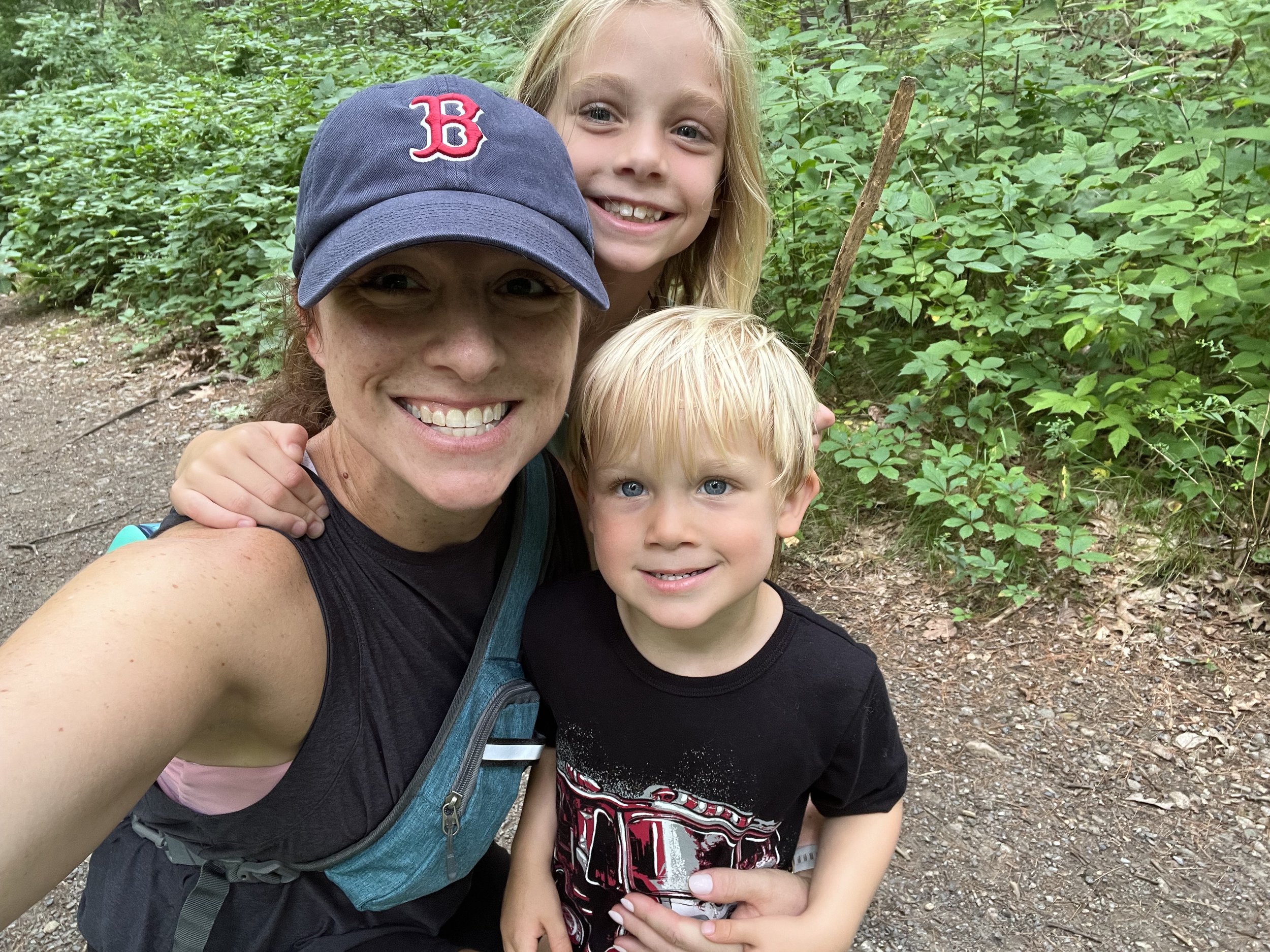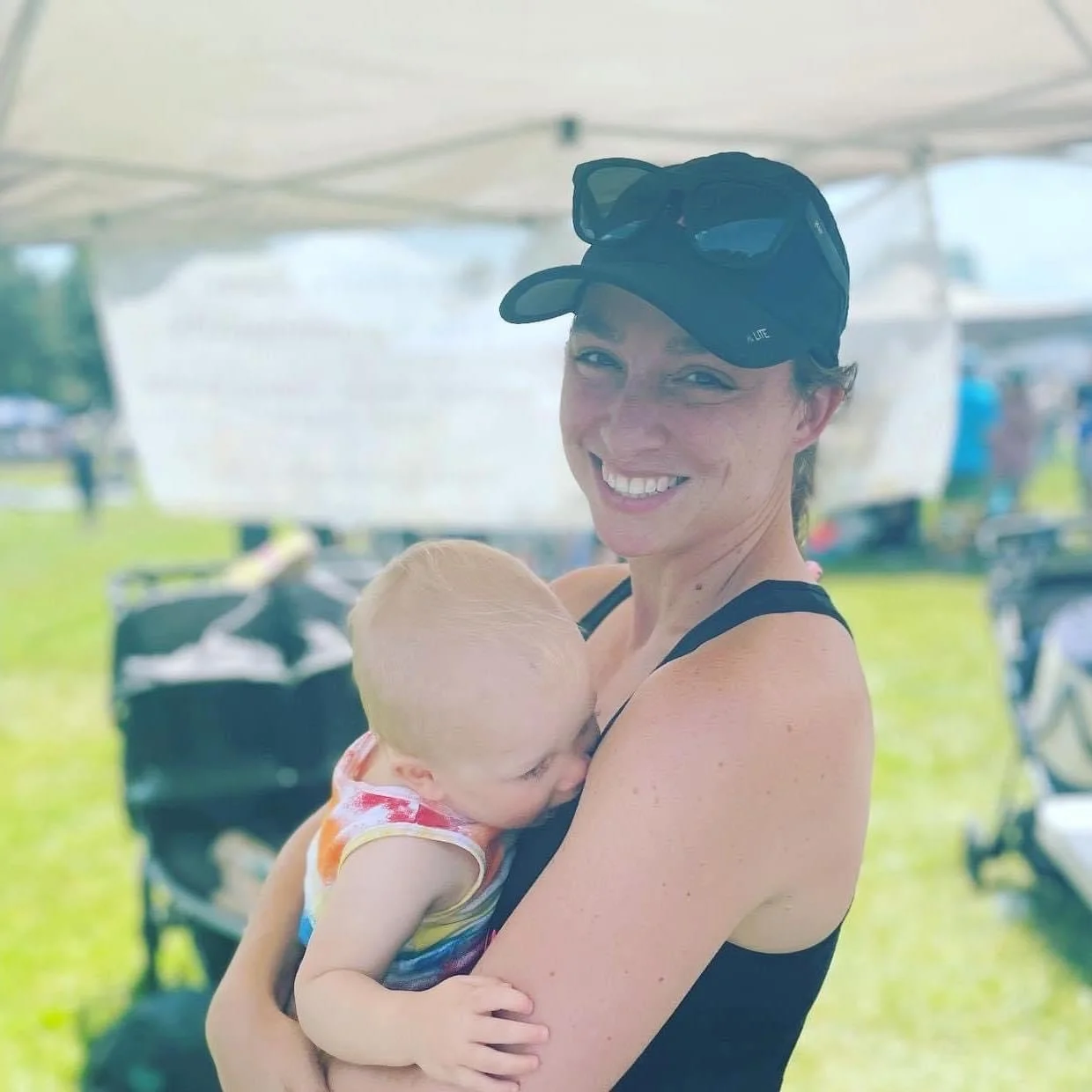The Great Unknown
When you have anxiety, you just always assume something is the matter with you. That’s me. A migraine is a brain tumor brewing. Heartburn is likely an ulcer or the start of esophagus cancer. Tiredness is potentially from many scary ailments – not from being a busy working mom to two young kids. However, nothing ever was the matter. Until now.
Ashley with her youngest in 2022
I have a history of breast cancer on my mother’s side. Since I am an anxious person, pain in my left breast a few years ago made me uneasy, so I had a mammogram and ultrasound even though I wasn’t due for one. Thankfully, everything was clear. However, I continued to read up and research my options for best preventing and detecting breast cancer given my family’s history.
In 2023, I read about the WISDOM study, which researches the best ways to detect breast cancer early in women. Part of that study was genetic testing. Being an anxious person and feeling it wasn’t far-fetched that I would develop some kind of cancer in the future, I had considered genetic testing in the past. Reasoning that I would rather know about my risk than not react and genuinely believing in the mission of the study, I decided to enroll. I was sent an at home genetic testing kit and sent it back in February of this year.
In early March, the phone rang. I was in the middle of getting ready to pick my kids up from school and immediately felt frozen. “You are positive for the gene,” the breast cancer specialist said. And while I had somewhat expected the news, it still felt shocking. I immediately focused on next steps and what appointments I would need, but it would take months before I truly understood what this would mean for my life overall.
What a BRCA2 mutation means
The BRCA2 mutation is mutation on the BRCA2 gene, which makes people more susceptible to certain cancers. They first discovered the BRCA2 gene in 1995. About 1 in 400 people have a BRCA2 mutation. The risk of breast cancer for someone with a BRCA2 mutation is between 55-69%, ovarian cancer 13-29% and there are also increased risks for other cancers.
My maternal grandmother, maternal aunt and maternal great aunt all had breast cancer – and this was one of the reasons I decided to proceed with genetic testing. While I knew I was at greater risk for breast cancer with my family history, having the BRCA2 gene mutation significantly increases the risk. Going into being tested, I didn’t realize that having the BRCA2 mutation didn’t just increase my risk for breast and ovarian cancer but it also carries an increased risk of melanoma and pancreatic cancer.
Once I received the results from the study, I did a lot of googling and made an appointment with Dana Farber. They have a Cancer Genetics and Prevention Center, so I set up an appointment with a genetic counselor and oncologist. After I had made the appointments, I really made a concerted effort to not google and read too much because I didn’t want to overwhelm myself. I had my first appointment, doing repeat genetic testing to confirm. The oncologist outlined the different options I have, which are numerous and provided information about my risks of developing breast and ovarian cancer, along with other cancers going forward.
My options for breast cancer included: annual mammogram and annual MRI spaced 6 months from each other to detect cancer as early as possible as well as a risk reducing bilateral mastectomy. For ovarian cancer, my options were removal of fallopian tubes and ovaries before age 45 or removal of fallopian tubes only and delaying removal of ovaries until age 50 or sooner depending on the timing of menopause.
Choices
Ashley with her husband and two children.
While I went to appointments and about my day-to-day life, it was a strange feeling to know I wasn’t sick but felt the impact of processing life-changing information. There were many hard days, some tears, some anger and often a sense of loneliness as I struggled how to share this news and if it was even appropriate to share. There was guilt as well on a few levels. One, I worry about the chances that I could pass the gene down and two, while it didn’t quite feel it, I was incredible lucky to have learned this information and have access to such high-quality medical care. I recognized so many people never had this chance or choice.
I decided my anxiety would be too much for me to do surveillance waiting for a cancer diagnosis, so I moved forward with scheduling a risk reducing bilateral mastectomy for early next year. I also met with a gynecological oncologist about options for ovarian cancer. At 37, I don’t want to go through menopause yet, but I’m also done having kids. There’s an ongoing study that is researching removal of only fallopian tubes and leaving ovaries until closer to menopause. I’m having laparoscopic surgery this month and will say goodbye to my tubes and hopefully reduce my risk of ovarian cancer. It’s funny, most people focus on breast cancer because the risk is higher but unlike breast cancer, ovarian cancer doesn’t have robust screening methods so usually when it’s diagnosed, it’s later stage. I’ll have my ovaries removed by the time I’m 50.
Navigating a new season
Ashley at The Chicago Marathon finish line.
If I am being honest, I feel like I lost a part of myself this past year. Even though I know I am so lucky to not be sick and to be able to choose risk reducing procedures, my life has changed. Specifically, my relationship with my body. I’ve been a distance runner for more than 15 years, completing 5 marathons and 14 half marathons. I was planning to start training for another marathon to run in the fall before I received the news. For some reason, I couldn’t bring myself to run – something that had been central to my life, to my mental health and to my identity. It was no longer an escape. It was a burden. This change was incredibly difficult to process. I’ve had to pivot and accept that maybe running isn’t what I need in this season of life. I’m probably in the worst shape of my adult life and I wish I were motivated to change that, but all my energy has gone to dealing with this and there hasn’t been any left for anything else.
This news isn’t exactly ideal for someone with anxiety. There is a lot of unknown to navigate. In one way, my situation makes sense to me because anxiety can make you feel like you are just waiting for something to be wrong with your health. I particularly struggle with whether I am making the right choices, if I am overreacting and should just go with surveillance. But also, I feel like once the surgeries are done, I’ll be relieved. I’ll have done something actionable to reduce my risk. I use therapy and try not to go down any internet rabbit holes to help. I’ve also found friends I feel comfortable venting to as well as another local mom going through the same process which helps me to talk through it.
My biggest piece of advice for women who want to be proactive about their risks for cancer is to work with a genetic counselor if you’re going to do the testing. There are a lot of at home options out there and I really think having a support team already in place makes a difference. While the Breast Health Specialist I spoke to on the phone was kind and informative, it wasn’t the same as working with a genetic counselor from the onset and being walked through the steps, and results, and what comes next. If you don’t have the familial history and aren’t eligible for genetic testing, it’s still so important to make sure you are doing the recommended screenings for all different cancers. And making sure you’re doing your own screening like breast exams.
When my surgeries are complete, I am looking forward to feeling strong again and hopefully training for another marathon or two in the next few years. I also hope I feel less burdened by this information. I hope to feel lighter, recognizing that this news changed my life but does not define it.
Ashley Liffers is a runner, mom and Mama Beast for life. She lives in Dedham with her husband and two children.




